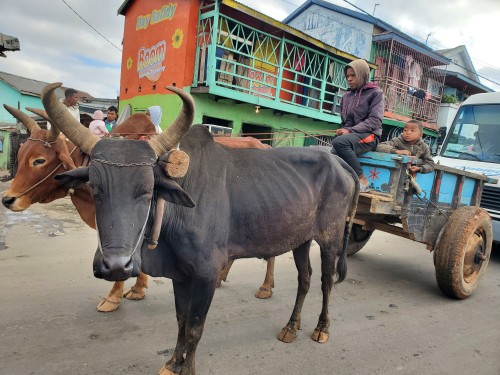The Malagasy people, at the crossroads of several worlds, embody unparalleled cultural and human richness. Settled on the island of Madagascar for millennia, the Malagasy, around 26 million people, carry within them the blended legacies of Africa, Southeast Asia, as well as Arab and European influences. Officially, they form 18 Malagasy ethnic groups, deeply attached to their traditions, while resolutely looking to the future. Additionally, there are foreigners who have recently settled on the island, bringing their own cultures. Let's embark on a journey to discover this human and cultural mosaic.
What does a Malagasy really look like?
Like everyone and no one in particular! A Malagasy traveling abroad is often mistaken for every possible nationality, except their own. This phenomenon is explained by the diversity of physical traits that seem to unite multiple races in Madagascar. The Great Island is often seen as a crossroads of civilizations. The first inhabitants are believed to have arrived from Indonesia and Malaysia nearly 2,000 years ago. This Asian origin is evident in the physical features, language, and customs. Soon, East Africa and Arab merchants also brought their influence, creating a unique blend. The Malagasy people are divided into 18 main ethnic groups, each with its own cultural specificities, while sharing a common language, Malagasy, which varies across dialects. What about skin color? It ranges from dark brown to pale, with all shades of yellow, while hair can be straight and long, or curly. The only common denominator seems to be the rather petite and compact build.
A civilization dominated by death
Respect for ancestors holds a central place in Malagasy culture. This is evident in the numerous tombs, surrounded by genuine terraced gardens, decorated with masterpieces of sculpture or engraving, which never fail to surprise foreign visitors. Dolmens and obelisks in the highlands, erotic-inspired statues in the southern thorn forests, paired pirogues along the east coast, and sacred caves in Ankarana: these elements are the concrete expression of Malagasy culture, where death is ever-present. Ceremonies related to the dead, such as the famadihana, or turning of the dead, regularly gather entire populations. During this symbolic ritual, the bodies of ancestors are exhumed, wrapped in new shrouds, and celebrated by the entire community. This ceremony illustrates the deep connection Malagasy people have with their roots, harmoniously blending the past and the present.
Fihavanana: a fundamental concept
At the heart of Malagasy society lies a fundamental concept: fihavanana. It expresses the values of solidarity, mutual aid, and social cohesion. Fihavanana makes each individual an active and responsible member of their community, ensuring the preservation of social harmony. This way of life strengthens the bonds between families, neighbors, and even strangers, making the Malagasy people known for their warm and sincere hospitality.
Craftsmanship, a national pride
From north to south, from east to west, the Malagasy people excel in craftsmanship, demonstrating creativity passed down from generation to generation. All types of items can be found: wood carving, Ambositra marquetry, delicate embroidery from Fianarantsoa, or wild silk weaving. Each piece reflects the unique expertise of its region. Malagasy artisans draw their inspiration from the surrounding nature and their cultural heritage, creating objects that are both functional and aesthetic.
Contemporary challenges
Despite this cultural wealth, the Malagasy people face contemporary challenges. Poverty, environmental issues, and rapid modernization put ancestral traditions to the test. However, the Malagasy show great resilience. They adapt, innovate, and find solutions to preserve their identity while embracing the opportunities of the modern world.
If you want to learn more about the Malagasy people, observe or study their customs, or discover the ancient traditions unique to Madagascar, don't hesitate to visit our website: https://www.vivytravel.com/. We will be delighted to assist you in your exploration!
